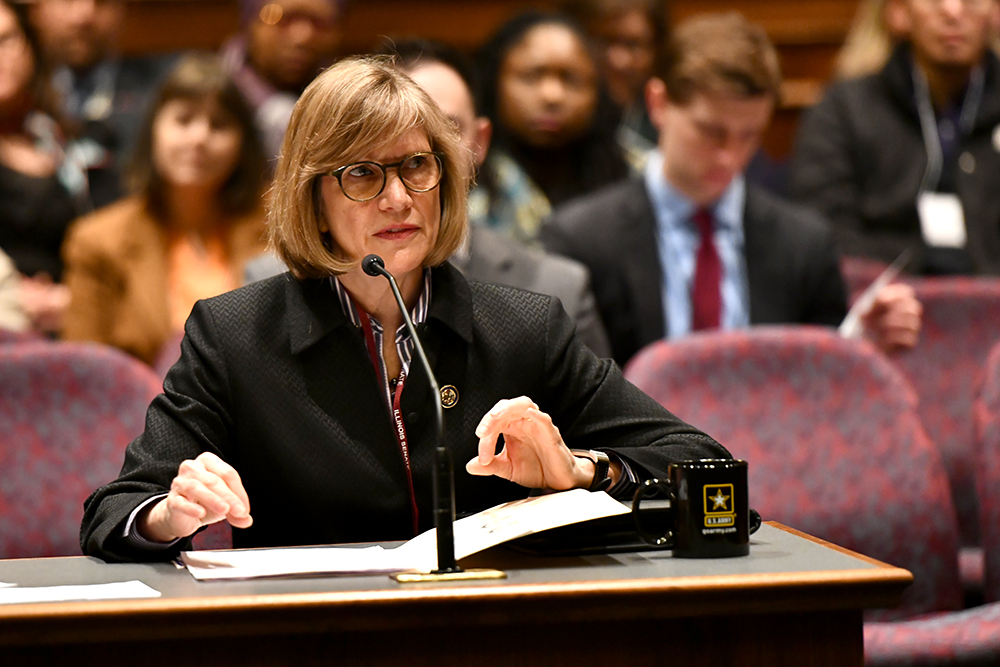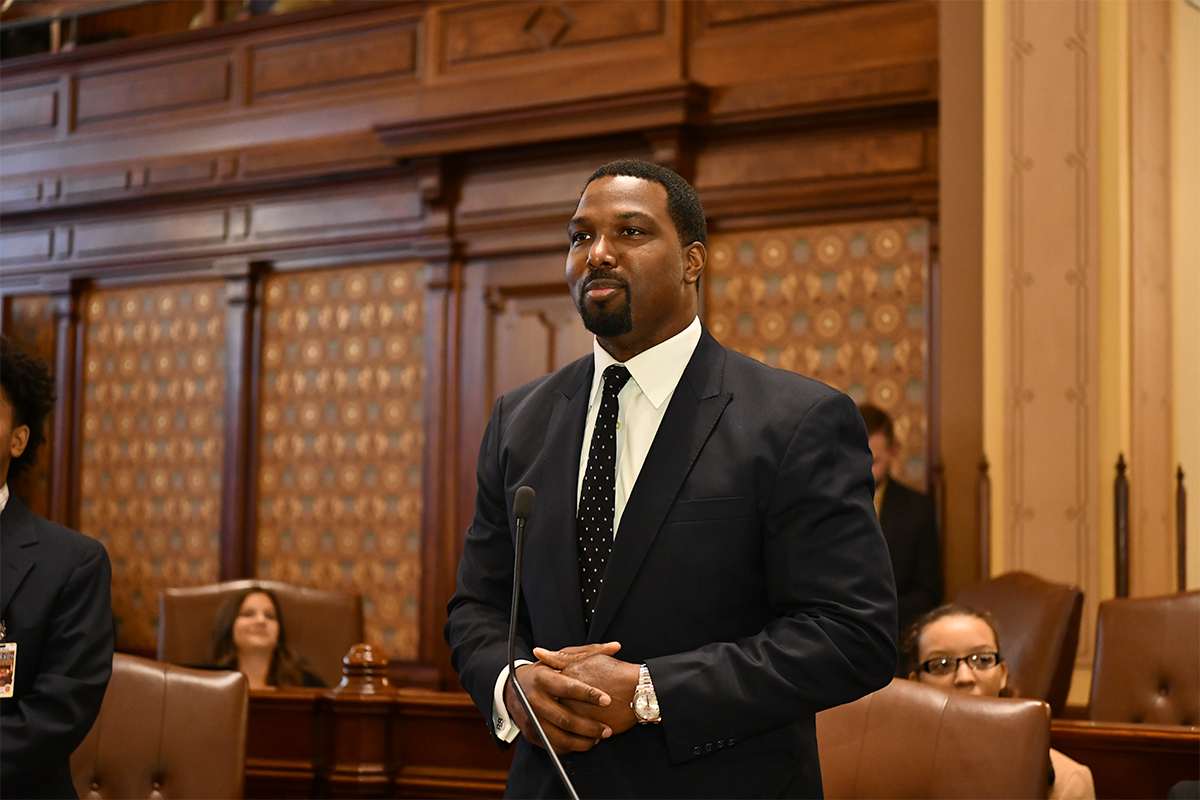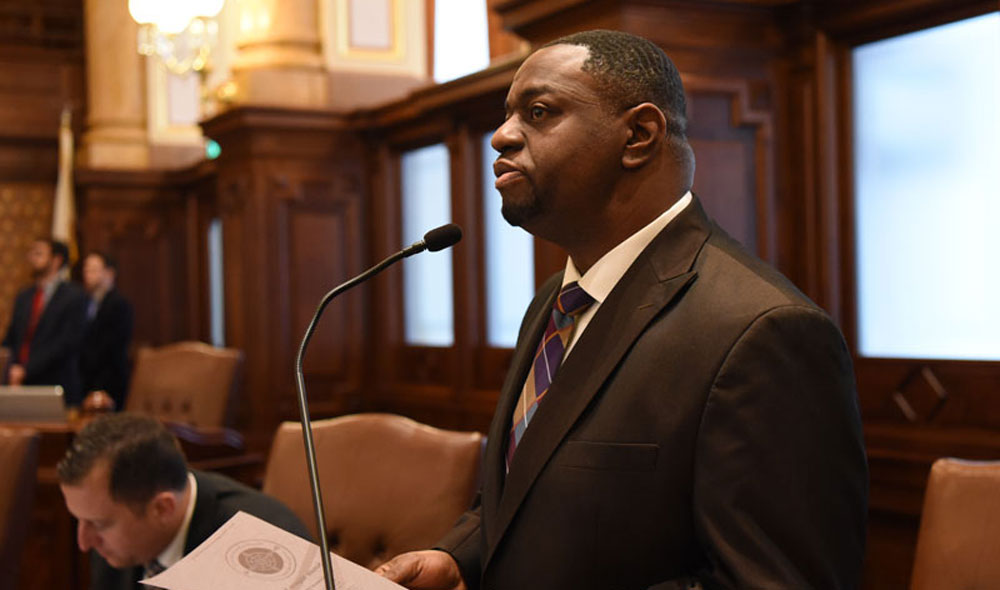- Details
- Category: Senator Rachelle Crowe News
 Chairwomen Crowe, Stuart pleased by collaborative effort
Chairwomen Crowe, Stuart pleased by collaborative effort
MARYVILLE – Recognizing the devastating effects isolation and emotional abuse could have on seniors during the pandemic, State Senator Rachelle Crowe (D-Glen Carbon) led a discussion about how to create additional protections for seniors at the final meeting of the Elder Abuse Task Force held Wednesday via teleconference.
“As a former prosecutor, I have witnessed numerous cases of older people being targeted, from scams to criminal abuse. Getting all involved departments into one discussion was an effective way to hear about the many forms elder abuse can take and the many ways it can harm,” Crowe said. “Considering the initiatives the group is exploring, I’m confident they’ll provide solutions we can act on to fight this growing threat to our elders.”
Read more: Elder Abuse Task Force meets to discuss issues related to COVID-19
- Details
- Category: Senator Cristina Castro News
 ELGIN – Since small businesses have taken some of the heaviest financial losses as a result of the COVID-19 pandemic, State Senator Cristina Castro (D-Elgin) is encouraging small business owners to take advantage of the federal Paycheck Protection Program.
ELGIN – Since small businesses have taken some of the heaviest financial losses as a result of the COVID-19 pandemic, State Senator Cristina Castro (D-Elgin) is encouraging small business owners to take advantage of the federal Paycheck Protection Program.
“The Paycheck Protection was established by Congress in order to help small businesses out in situations exactly like this one,” Castro said. “If you’re a struggling business owner, it’s important to realize that there is help available to get you through this crisis, and you should make use of it.”
Paycheck Protection Program loans were established by the Department of Treasury as a way to help businesses that are having difficulty paying their employees. The loans have a 1%interest rate, and can be forgiven in full if used entirely for the purpose of covering payroll costs, rent, utilities or mortgage interest.
“PPP loans have two important purposes: to ensure that small businesses can keep their doors open in times of hardship, and to prevent employees of those businesses from losing their jobs,” Castro said.
A PPP loan can be up to $10 million per businesses and are awarded on a first come, first served basis. Applications are due by Aug. 8 and can be filled out here.
- Details
- Category: Senator Suzy Glowiak Hilton News
 WESTERN SPRINGS – State Senator Suzy Glowiak Hilton (D-Western Springs) encouraged small business owners to apply for Paycheck Protection Program and other forgivable loans from the U.S. Small Business Administration on news the program has been renewed.
WESTERN SPRINGS – State Senator Suzy Glowiak Hilton (D-Western Springs) encouraged small business owners to apply for Paycheck Protection Program and other forgivable loans from the U.S. Small Business Administration on news the program has been renewed.
“Small businesses and their employees who are doing everything right during this pandemic and accepting things like staggered hours, strict occupancy requirements, or even complete closure deserve our support,” Glowiak Hilton said. “This program can help people keep their income during closures and stay in business when it is safe to fully reopen.”
Small businesses may apply for a portion of $10 million in relief through this first come, first served program. PPP allows business owners to keep employees on payroll and pay overhead expenses during closures. The extended deadline is Aug. 8.
PPP loans have an interest rate of 1% and can be fully forgiven if used for payroll, rent, utilities or mortgage interest. Participating lenders can be found on the U.S. Small Business Administration’s website.
- Details
- Category: Senator Napoleon Harris III News
 DOLTON – State Senator Napoleon Harris (D-Harvey) urges community-based organizations that provide support services and resources to apply for a percentage of the $7.1 million worth of newly approved grants from the Illinois Criminal Justice Information Authority.
DOLTON – State Senator Napoleon Harris (D-Harvey) urges community-based organizations that provide support services and resources to apply for a percentage of the $7.1 million worth of newly approved grants from the Illinois Criminal Justice Information Authority.
“A strong support system for communities is what’s needed the most on this road to recovery,” Harris said. “While every community has been impacted by the negative effect of COVID-19, disproportionate communities had unequal resources even before this and that’s why this program is so essential for their recovery.”
The Illinois Criminal Justice Information Authority Coronavirus Emergency Supplemental Funding Program provides funding to community-based agencies in areas disproportionately impacted by the coronavirus pandemic. Funds must be used for rent or utilities assistance, supportive services, or distribution of food to local residents.
For more information and to apply for funding, click here. Application are due by Friday, July 24.
- Details
- Category: Senator Patrick Joyce News
 PARK FOREST – State Senator Patrick Joyce (D-Park Forest) is encouraging small businesses to apply for COVID-19 relief funds through the U.S. Small Business Administration’s Paycheck Protection Program.
PARK FOREST – State Senator Patrick Joyce (D-Park Forest) is encouraging small businesses to apply for COVID-19 relief funds through the U.S. Small Business Administration’s Paycheck Protection Program.
“This program is a great opportunity for businesses to gain some financial certainty while they try to weather this pandemic,” Joyce said. “I strongly encourage small businesses to contact their banks before the Aug. 8 deadline to see if they are eligible to benefit.”
The application period has been extended to allow more businesses to apply for a portion of $10 million in relief funding. Loans will be distributed on a first-come, first-served basis and may be used to keep employees on the payroll and pay overhead expenses.
More than 27,000 Illinois businesses have already taken advantage of the loans – saving an estimated 1.36 million jobs – according to the Small Business Administration.
PPP loans have an interest rate of 1% and can be fully forgiven if they are used for eligible costs, including payroll, rent, utilities or interest on mortgages. To find participating lenders, business owners and managers can visit the Small Business Administration’s website here.
- Details
- Category: Senator Emil Jones III News
 Jones announces $7.1 million worth of newly approved grants from the Illinois Criminal Justice Information Authority
Jones announces $7.1 million worth of newly approved grants from the Illinois Criminal Justice Information Authority
CHICAGO – In an effort to help communities hardest hit by the COVID-19 pandemic, State Senator Emil Jones, III (D-Chicago) announced organizations that provide support services and resources should apply for a percentage of the $7.1 million worth of newly approved grants from the Illinois Criminal Justice Information Authority.
“No community has suffered more impact from COVID-19 than underprivileged communities,” Jones said. “I urge local community organizations to apply for the Coronavirus Emergency Supplemental Funding Program to help disproportionate communities recover.”
The Illinois Criminal Justice Information Authority Coronavirus Emergency Supplemental Funding Program provides funding to community-based agencies in areas disproportionately impacted by the coronavirus pandemic. Funds must be used for rent or utilities assistance, supportive services, or distribution of food to local residents.
For more information and to apply for funding, click here. Application are due by Friday, July 24.
- Details
- Category: Senator Christopher Belt News
 EAST ST. LOUIS - To support communities hardest hit by COVID-19, State Senator Christopher Belt (D-Centreville) encourages organizations providing support services and resources to apply for a percentage of the $7.1 million worth of newly approved grants from the Illinois Criminal Justice Information Authority.
EAST ST. LOUIS - To support communities hardest hit by COVID-19, State Senator Christopher Belt (D-Centreville) encourages organizations providing support services and resources to apply for a percentage of the $7.1 million worth of newly approved grants from the Illinois Criminal Justice Information Authority.
“Disproportionate neighborhoods have suffered the most from the COIVD-19 health crisis, Belt said. “In these communities, paying for basic necessities have become unmanageable and providing those communities with support to recover from the devastating losses is something the program will do.”
The Illinois Criminal Justice Information Authority Coronavirus Emergency Supplemental Funding Program provides funding to community-based agencies in areas disproportionately impacted by the coronavirus pandemic. Funds must be used for rent or utilities assistance, supportive services, or distribution of food to local residents.
For more information and apply for funding here. Application are due by Friday, July 24.
- Details
- Category: Senator Patricia Van Pelt News
 CHICAGO – State Senator Patricia Van Pelt (D-Chicago) is calling for the Chicago Police Department to apologize for the murders of Fred Hampton and Mark Clark in 1969.
CHICAGO – State Senator Patricia Van Pelt (D-Chicago) is calling for the Chicago Police Department to apologize for the murders of Fred Hampton and Mark Clark in 1969.
“The murders of Fred Hampton and Mark Clark were violent and brutal acts by the Chicago Police Department. Though it happened more than 50 years ago, Black Americans are still waiting for justice and accountability,” Van Pelt said. “How are Black and Brown Americans ever expected to trust the police when they got away with murder, and continue to do so?”
More Articles …
- Bertino-Tarrant: Every student in the state deserves a quality education
- Castro urges those working to heal communities from COVID-19 to apply for new grants
- Link encourages local businesses to apply for Paycheck Protection Program
- Peters encourages organizations to apply for grants for food, housing, rent
Page 609 of 720












 © 2025 Illinois Senate Democratic Caucus
© 2025 Illinois Senate Democratic Caucus